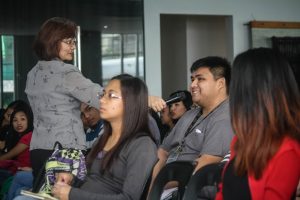Once again, the Research and Development Center have organized a seminar which will further boost the research competencies of faculty and students. The seminar was entitled Formulation of Data Gathering Tools, this is the third series of the four-installment of seminar which was done at the Centennial Hall on September 24, 2016.
research competencies of faculty and students. The seminar was entitled Formulation of Data Gathering Tools, this is the third series of the four-installment of seminar which was done at the Centennial Hall on September 24, 2016.
A total of 182 students and 16 faculty members from the Graduate School, School of Allied Medical Sciences, School of Accountancy and Business Administration, School of Criminal Justice and Public Safety, School of International Hospitality and Tourism Management, School of Information Technology, School of Liberal Arts and Human Sciences, School of Dentistry and School of Teacher Education have attended the seminar.
The resource speaker of the seminar was Dr. Aida A. Dapiawen, Dean of School of Liberal Arts and Human Sciences.
Dr. Dapiawen discussed the specifics of data gathering tools or instruments that the audience should know and must apply for writing their research papers. She gave three (3) key concentrations for the seminar: the introduction, data collection tools and the questionnaire.
First, the introduction part, the keywords were identified such as data, research data, and data collection. Two fundamental types of data which are qualitative and quantitative type were explained. Data collection strategies were also enumerated as well as the sources of information. Characteristics of data collection instruments were also mentioned and discussed fully. It is important that the researcher should know the relevance, credibility, validity, reliability and usability of the research tool.
Second, the data collection tools, the topics included were observation, interview, surveys and questionnaires. Observation is a precise description of events, behaviors, and artifacts in the social setting chosen for study. Dr. Dapiawen gave numerous examples for this area. Identification of the degree of structure and observations are unstructured and semi-structured. She also cautioned the researchers on what to observe and at what time the comment was helpful. Observation of ethics and the anonymity of the participants must be well-preserved. During the conduct of interview, the interviewer must respect the individual as well as the culture of the group. In the same way, the researchers have to be very careful with the interview question pitfalls such as leading questions, double-barreled questions, and loaded questions. The discussion was done for survey questionnaires types such as open-ended and close-ended questionnaires.
Finally, presentation of the constructions of rating scales for the research results and how it will be well-interpreted.
The concluded seminar provided an avenue for the students to boost their research skills and researches, and to further bolster the research capabilities of the university- Eden Catu-RDC
